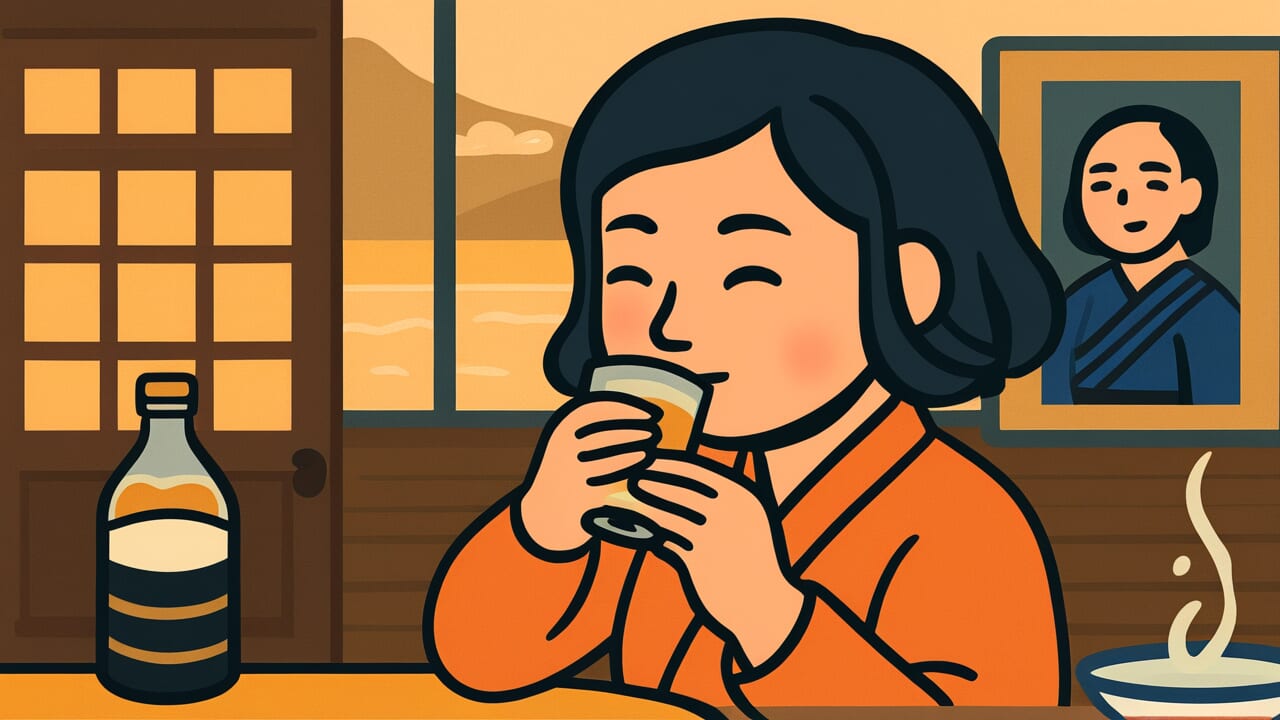How to Read “I’d pawn my wife before I’d give up morning sake”
Nyōbō wa shichi ni oite mo asazake wa yamerarenū
Meaning of “I’d pawn my wife before I’d give up morning sake”
This proverb means that people who love alcohol cannot quit drinking, no matter what they sacrifice.
It uses an extreme example to show the horror of addiction. Someone would pawn even their wife, who should be most precious, just to get money for morning sake.
People use this saying when criticizing or warning someone who is deeply addicted to alcohol, gambling, or other vices.
It’s also used when people talk about their own bad habits in a self-mocking way. The proverb points out human weakness when desire takes priority over important things.
Today, this lesson applies beyond alcohol to gambling, gaming, shopping, and various other addictions.
The image of people losing precious things because desire controls them, even when they know better, remains true across time.
Origin and Etymology
The exact first written appearance of this proverb is unclear. However, it likely reflects the daily life of common people during the Edo period.
“Shichi ni oku” means to pawn something at a pawnshop to borrow money.
During the Edo period, pawnshops were essential to common people’s lives. Pawning kimono and household items for cash was a last resort when facing financial hardship.
The phrase “pawning one’s wife” appeared in rakugo comedy and senryu poetry of that time. It was a common expression showing extreme poverty.
Of course, you couldn’t actually pawn your wife. The expression exaggerated a desperate situation for effect.
“Asazake” means drinking sake in the morning. During the Edo period, morning drinking symbolized a lazy lifestyle of pleasure without work.
Sake wasn’t as expensive then as it is now. But drinking every morning still cost a lot of money.
This proverb uses extreme language to show how alcohol lovers sacrifice precious things yet cannot quit.
It was born from Edo people’s life experience and their sharp observation of human desire.
Interesting Facts
Edo period pawnshops accepted kimono, household goods, and various tools as collateral.
Pawnshops were called “nanatsuya” (seven shops). Monthly interest was typically seven percent.
For common people, pawnshops were important financial institutions for managing living expenses before payday.
During the Edo period, there was another proverb with opposite meaning about morning sake.
It said “drink morning sake even if you must sell your rice field.” This meant a morning drink was good for health.
But it originally referred to a small amount of sake for medicinal purposes. A moderate morning drink and addictive drinking have completely different meanings.
Usage Examples
- He’s addicted to pachinko and spends his entire salary. It’s exactly like “I’d pawn my wife before I’d give up morning sake.”
- Spending all your savings on game purchases is the same as “I’d pawn my wife before I’d give up morning sake.”
Universal Wisdom
This proverb has been passed down because it sharply captures the essence of human desire.
All of us have experienced becoming absorbed in something, haven’t we?
Two forces constantly work within humans: reason and desire. Reason warns us, “You must not go further.”
But desire keeps whispering, “Just a little more” or “Just this once.” And when desire overcomes reason, people lose sight of what truly matters.
This proverb uses the extreme phrase “pawning one’s wife” to emphasize the horror of addiction.
Prioritizing a morning drink over one’s wife, who should be most precious, shows a state where normal judgment is completely lost.
Our ancestors knew that once people become captives of desire, they can fall endlessly.
That’s why they issued this warning with such powerful language. It’s not simply criticism of drinkers.
It’s deep insight into the weakness all humans possess. The importance of controlling yourself before desire controls you.
This proverb continues to convey that truth across time.
When AI Hears This
The human brain doesn’t calculate time value mathematically correctly.
Behavioral economics experiments show that most people choose 10,000 yen today over 11,000 yen in one year.
But when choosing between 10,000 yen in five years or 11,000 yen in six years, more people can wait. It’s the same one-year difference, but people judge more calmly about distant futures.
This is called “hyperbolic discounting.”
What’s frightening about this proverb is the seriousness of pawning one’s wife. You need money to redeem her from the pawnshop, and the marriage will certainly break.
The future loss is immeasurable. Yet someone still prioritizes that morning drink.
Working backward from this, we see that in an addicted brain, immediate pleasure’s value inflates tens or hundreds of times beyond normal.
Research shows that drug addicts’ brains undergo changes in reward circuits. The prefrontal cortex, which normally applies rational brakes, functions less effectively.
In other words, distorted discount rates are physical brain changes.
This proverb treats addiction not as a moral problem but as a malfunction in the brain’s time calculation system.
It’s amazing that Edo period people mathematically expressed addiction’s essence through a state where even the most precious things can’t be properly weighed.
Lessons for Today
This proverb teaches us that the entrance to addiction is open to everyone.
Alcohol, gambling, games, social media, shopping. The forms differ, but the danger of getting hooked is always nearby.
What matters is developing the habit of viewing your behavior objectively.
If you feel “I can’t relax without this” or “I want to quit but can’t,” that might be a warning sign.
Stop early and ask yourself what truly matters.
Also, pay attention to changes in people around you. When you see someone important getting absorbed in something, don’t criticize them.
Show support instead. Addiction often deepens from loneliness.
This proverb wasn’t born to mock human weakness. It exists as wisdom to protect ourselves.
To avoid losing what truly matters in your life, sometimes stop and think.
Taking that time is the most important lesson this proverb teaches.



Comments